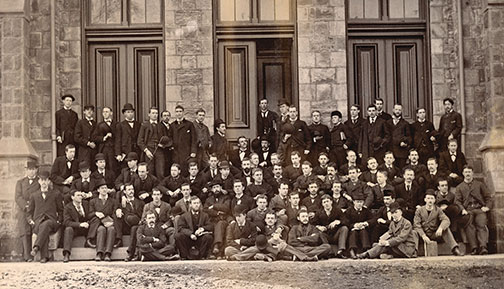“Colleges Labeled Stronghold of Reds” reported the Los Angeles Times April 14, 1957, when the Rev. Hugh Halton gave a fiery right-wing speech in California as part of a 21-stop nationwide tour. In Nassau Hall, administrators cringed at this latest assault from the young priest who had been badmouthing them for two years, calling eminent Princeton faculty atheistic and incompetent.
This felt like betrayal: After all, Halton was the University’s Catholic chaplain.
Unlike William Buckley, whose book God and Man at Yale had raised similar objections against left-leaning academics, Halton had no genius for building political movements. Instead, he carried on a one-man crusade against modernity, starting with sermons and letters-to-the-editor excoriating philosophy professor Walter Stace, a self-professed atheist whose teachings, Halton said, aimed at “enthroning the devil.”
Other faculty members were drawn into the fray, Halton using his influence over students to steer them away from supposedly atheistic courses. The Oxford-educated Dominican regarded intellectualism as impossible without the “fixed standard of God.” Increasingly he hinted of Communist inroads in the Academy.
In fall 1957, Princeton got a new president, Robert Goheen ’40 *48. On his first day he announced the severing of all official ties with Halton, who had accused the administration of “malfeasance” and who, Goheen said, had “resorted to irresponsible attacks upon the intellectual integrity of faculty members.” (Halton remained in charge at Princeton’s Aquinas Institute for another year, however.)
Time and other media outlets spread the story nationwide as conservatives howled that Halton had been muzzled. The firebrand priest left for Oxford, charging “authoritarian censorship” and an “attempt to impose thought control.”
In the end, Communists didn’t take over Princeton, but the ’60s lay right around the corner, bringing secularization far beyond Halton’s imaginings.












4 Responses
Dr. John G.W. Kelley
7 Years AgoRev. Hugh Halton's Award
In 1957, the Catholic War Veterans of New Jersey awarded R.I.-born Rev. Hugh Halton, along with other two N.J. men, its highest award for doing "the most during the year for God, country, and home." The two other men were James P. Mitchell, U.S. secretary of labor from 1953 to 1961 during the Eisenhower administration; and Vincent A. Weiss, managing editor of the Monitor newspaper.
Herbert J. Kaufmann ’55
10 Years AgoHugh Halton’s Legacy
The article regarding Father Halton was not really accurate in characterizing Professor Walter Stace as “a self-professed atheist.” I remember much of the controversy that went on while I was an undergraduate.
Mr. Stace, an Englishman who had a religious conversion experience in his youth and served in the Indian Civil Service in Ceylon for 22 years, was heavily influenced by Eastern religion and wrote extensively on mysticism. He certainly did not believe in Father Halton’s brand of religion, but it is clear that anyone who could say “to ask for a proof of the existence of G0d is on a par with asking for a proof of the existence of beauty” is not your standard atheist. What Mr. Stace had was wisdom, not belief; I don’t think Father Halton was able to understand that.
Mr. Stace’s son, Noel, was a classmate and friend. He was killed in a naval air-training accident about five years after graduation. I wrote Mr. Stace, and he wrote back a touching letter saying “sometimes life can seem so utterly unfair.” The “seem” was typical of the man.
Norman Ravitch *62
10 Years AgoHugh Halton’s Legacy
I was surprised to see a short item about Father Hugh Halton (That Was Then, April 2). I attended his Masses from 1957 to 1960 and found his homilies focused mostly on religion, not politics. He was a learned and gentle man, not a firebrand. He was way ahead of his time, not quite realizing that Princeton was abandoning Calvinism for Marxism as he spoke.
It’s odd that it was left to a Catholic cleric in a very non-Catholic university environment to object to secularization and the denigration of religion. Where were the Presbyterian or Episcopal clergy then? Probably they already were corrupted pretty well themselves. As I write this, 90 percent of the membership of the mainstream Protestant churches has vanished. The Catholics doubtless will go the same way, more slowly, as America joins Europe in massive apostasy. Thanks for remembering Father Halton.
James F. O’Rorke Jr. ’58
10 Years AgoHugh Halton’s Legacy
Hugh Halton (I cannot bear to accord him a clerical appellation) was a brilliant, arrogant, egotistical proselytizer who delivered sermons (ranging from tedious and self-aggrandizing to pure pap) with an elegant, Oxonian-accented, mellifluous baritone.
As a Catholic freshman in 1954, I acquired my first Chapel credits at Mass celebrated by Halton. His ministry (if one cares to call it that) furthered my education because, by graduation, most of my Chapel credits had been earned at Protestant and Jewish services. I know that Halton (inadvertently) helped many Princetonians broaden their horizons similarly.